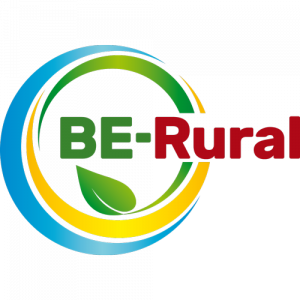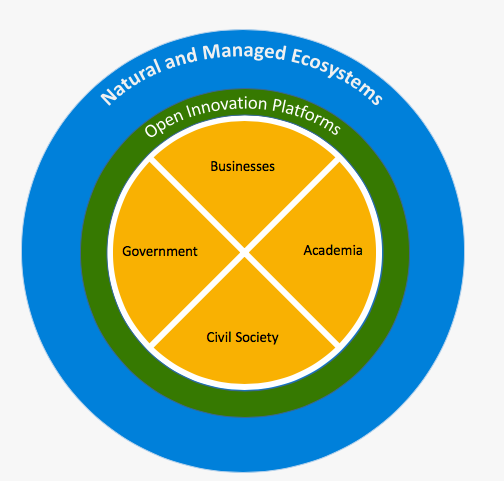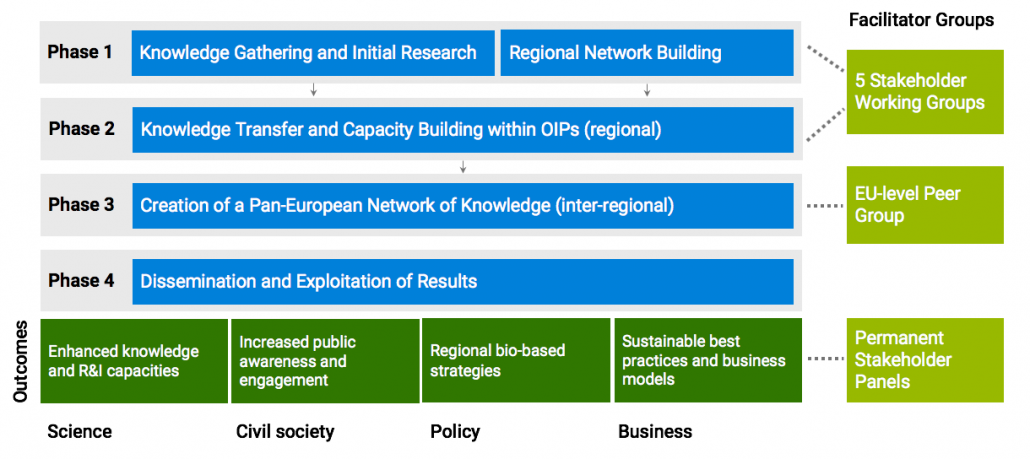The overall goal of BE-Rural is to realise the potential of regional and local bio-based economies by supporting relevant actors in the participatory development of bioeconomy strategies and roadmaps. Specifically, the project has the following objectives:
- To support modest and moderate innovator countries in the development of regional bioeconomy strategies and roadmaps.
- To increase awareness, education and understanding of the bioeconomy, its potentials and impacts among regional actors by considering stakeholders’ and citizens’ needs and concerns.
- To mobilize engagement among regional stakeholders and citizens in view of the development of inclusive and balanced bioeconomy strategies and roadmaps.
- To build capacity among regional stakeholders regarding the assessment of innovative bio-based business models and their potential impacts, the fostering of R&I capacities, the design of a supportive policy framework, and effective utilization of available funding streams.
- To explore small-scale business models and their market potentials suitable for realising bio-based innovations across different bioeconomy sectors.
- To identify and disseminate good practices and facilitate knowledge sharing across European regions
- To generate new knowledge on the effective development of regional bioeconomy strategies and roadmaps and to make that knowledge available for uptake in policy processes in other regions across Europe.
To meet these objectives, BE-Rural will build on the following principles, which are reflected in the project’s conceptual approach and work plan:
Co-creation: BE-Rural builds on the idea that providing spaces for co-creation for a broad spectrum of stakeholders and citizens will not only contribute to broader societal goals, which can be embedded in the regional strategies and roadmaps, but can stimulate a stronger demand for sustainable, innovative products and services in the regions. The development of bio-based business models and encompassing regional strategies and roadmaps will be embedded in a structured participatory process which ensures the proper evaluation of alternative policy options and business strategies and their effects on the region. This implies that trade-offs will be made explicit and discussed among relevant stakeholders and the general public, aiming at the definition of shared objectives and the creation of mutually valued outcomes.
Openness and Inclusiveness: The regional strategy and roadmap development processes will be open to all relevant stakeholder groups. Besides the so-called ‘Triple Helix’, representing government, business and academia, BE-Rural will strongly encourage the participation of civil society (organisations) in these processes, thereby facilitating multi-faceted discussions and the implementation of broadly shared objectives. The participation of women will be specifically encouraged to ensure a gender-balanced representation of stakeholders and end-users in all related activities.
Sustainability: The regional strategy and roadmap documents will equally address the three pillars of sustainability (social, environmental and economic sustainability) and explicitly promote the sustainable use of agricultural, forest and marine ecosystems. Explicit reference will be made to the UN’s 2030 Agenda for Sustainable Development and its Sustainable Development Goals (SDGs) as incorporated in the European Commission’s Communication on ‘Next steps for a sustainable European future’ (COM(2016) 739), and to the objectives of the EU’s Circular Economy Action Plan.
Concept of BE-Rural
The BE-Rural conceptual approach builds on a Quintuple Helix Approach, which combines knowledge and innovation generated by key stakeholders from policy, business, academia and civil society within the frame of the environment (Carayannis & Campbell, 2010).
Grundel & Dahlström (2016) applied the Quintuple Helix Approach to the forestry-based bioeconomy, and BE-Rural will expand it to other bioeconomy sectors, specifically agriculture, fisheries and green industry. BE-Rural will thereby address the requirement to operate the bioeconomy within safe ecological limits.
Approach of BE-Rural
BE-Rural incorporates multiple stakeholder groups and contextual considerations that relies fundamentally on mutual capacity building and the generation and transfer of knowledge. The bio-based economy and the beginnings of policy movement in this field require a pooling of knowledge and experience, which is the foundation of the BE-Rural conceptual approach. This conceptual approach is represented in four phases of capacity building, knowledge generation and transfer.
These phases interact with facilitation groups, which are groups of actors that add knowledge, provide guidance, and validate findings. The outcomes of these four phases and of the interaction with the facilitation groups directly relate to the key stakeholders from policy, business, science and civil society (see figure).



